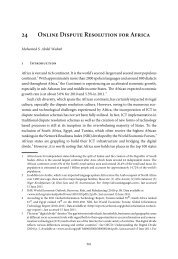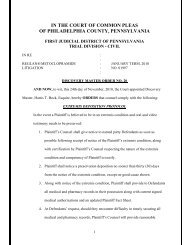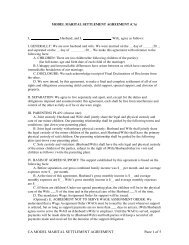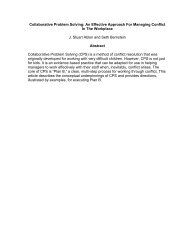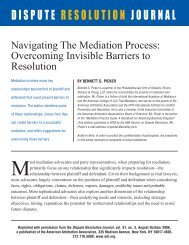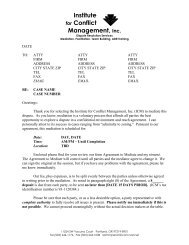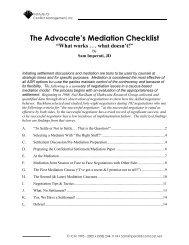17 e-Mediation - Mediate.com
17 e-Mediation - Mediate.com
17 e-Mediation - Mediate.com
Create successful ePaper yourself
Turn your PDF publications into a flip-book with our unique Google optimized e-Paper software.
Noam Ebner<br />
– External experts can be consulted with, or brought into the process as necessary,<br />
regardless of their geographical location, and without disrupting the process’ dynamics.<br />
3.3.2 Disadvantages of E-<strong>Mediation</strong><br />
3.3.2.1 Disadvantages for Parties<br />
In cases where parties file a case and are contacted by a mediator assigned by a service<br />
provider, it is challenging for parties to connect with mediators or to assess them. Parties<br />
cannot rely on local reputation, and there are few internet resources to assist them. 30<br />
– Good face-to-face negotiators, able to steer interactions (including mediated interactions)<br />
their way through <strong>com</strong>munication techniques, conversation dominance, volume<br />
or body language, may be handicapped online;<br />
– Archived materials – preserved as video or text – are always out there. Once a party<br />
posts something in a discussion forum or participates in a recorded videoconference,<br />
their words are out of their hands forever. While many service providers are explicit<br />
about their security procedures, there are no certain guarantees in internet security.<br />
3.3.2.2 Process Disadvantages<br />
– The most <strong>com</strong>monly discussed process disadvantages are the lack of warmth, empathy,<br />
immediacy, rapport and other attitudes and affects that make face-to-face mediation<br />
what it is. While efforts are made to explain how to <strong>com</strong>pensate for these in online<br />
<strong>com</strong>munication, and even to utilize certain characteristics of online <strong>com</strong>munication<br />
to achieve gains on these elements beyond what face-to-face <strong>com</strong>munication permits, 31<br />
this is still, in many aspects and to many <strong>com</strong>municators, an uphill battle.<br />
– Messages conveyed online, and particularly those conveyed through text, are prone to<br />
misinterpretation, 32 to misattribution 33 and to causing deterioration of trust. 34<br />
– The online venue challenges the function served by apology in mediation, given that<br />
party sincerity cannot be gauged without contextual cues. 35<br />
30 For those seeking to translate this into a business opportunity, is presently available<br />
for sale.<br />
31 See M. Morris et al., “Schmooze or Lose: Social Friction and Lubrication in E-Mail Negotiations”, Group<br />
Dynamics: Theory, Research, and Practice (2002) 6, 1; N. Ebner, “Trust-Building in E-Negotiation”, in<br />
L. Brennan & V. Johnson (eds.), Computer-<strong>Mediation</strong> Relationships and Trust: Managerial and Organizational<br />
Effects, Hershey, PA, Information Science Publishing 2007; Ebner et al. (2009).<br />
32 Thompson (2001).<br />
33 J. Nadler & D. Shestowsky, “Negotiation, Information Technology, and the Problem of the Faceless Other”,<br />
in L.L. Thompson (ed.), Negotiation Theory and Research, New York, Psychology Press 2006.<br />
34 Ebner (2007).<br />
35 See, for example, the Cyberweek 2010 discussion forum led by Sam Edwards, Eileen Barker and Michael<br />
Cote. available at , and the panel webinar on<br />
mediation styles and mediator moves in the online environment, available at<br />
378



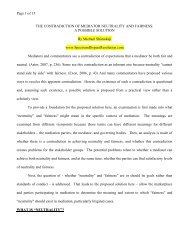

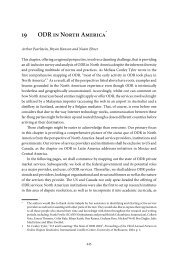
![Settlement Agreement Form [Agreement] - Mediate.com](https://img.yumpu.com/50682143/1/190x245/settlement-agreement-form-agreement-mediatecom.jpg?quality=85)

